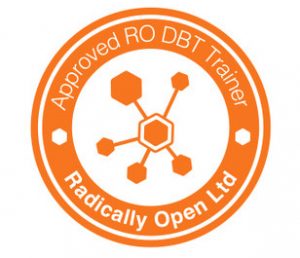Fast-Forward, Boring Celebration, Spin Cycle, Bulldozer, Pulking…. what on earth do these things have in common? They are all social signaling target names!
Social signals are focused on as the primary mechanism of change in RO DBT and targeting is the process of identifying the maladaptive social signals that are keeping our clients out of the tribe. But once we have identified them, then what? We need to give them a name for the diary card!
A great target name is hard to forget and even silly sometimes, it describes what the social signal looks like and captures the maladaptive features. I mean seriously, who really wants to spend time with a Bulldozer? Some social signal target names are easy like ‘correcting’ or ‘demanding,’ where it’s apparent from the verb what the action is that is taking place. But other targets can be a bit trickier to define when the signal is a combination of verbal or non-verbal behaviors.
Take Hulkin’ Out for instance, this occurred for a client whenever she was with her romantic interest and they would ask her a personal question. She would immediate begin to tense her upper body, puffing her shoulders out and up towards her ears, and freeze in a wide-eyed look. She had been given feedback from her partner that this signal looked as if she was uncomfortable and closed to sharing, upon demonstration I concurred. In mimicking this back to her I stated, “ok, let me try, I want to make sure I get this” and exaggerated this puffed-up and frozen signal back ending with “phew, I feel like I’m really Hulkin’ Out.” She started laughing out loud and said, ‘Yes! It is like the Hulk, all beefy and intense!” And so Hulkin’ Out it became which allowed the client to easily identify both the sensation of tensing up and the off-putting signals that were being portrayed.
Sometimes a target name can be tied to a pop-culture reference. For instance, with a teenager I might place the label Spillin’ Tea on the diary card; currently translated in Florida, USA adolescent vocabulary as ‘gossip.’ Don’t be afraid to get pop-culture references wrong! It can be fun and great modeling too, have a nice laugh at our foibles in session or class. Once in adolescent skills class I committed a fatal old-person-sin and referenced the popular streaming app “The NETFLIX.” As soon as it came out of my mouth, I knew it was wrong! We all got a good laugh at that one, I got up and pretended to walk around the room with a cane.
What about other creative strategies for target names? You can combine the names of two signals such as Pouting + Sulking = Pulking. You can label the irony, for example, a Boring Celebration is not a celebration at all, just a flat face in an exciting situation. You can reference household appliances like being on Spin Cycle is repeating words and phrases again and again.
I’ve been asked by other RO clinicians, “Well what if the name falls flat? Or the client gets offended?” Isn’t that wonderful! This can be an opportunity for the clinician or client to demonstrate being open and flexibly respond. Maybe it’s an opportunity for a great self-enquiry question. Or maybe you will have an alliance rupture to repair (remember, we don’t shy away from these as the repairs are intimacy enhancing). Either way the outcome is a win-win.
Through the use of creative and witty names we are smuggling to our clients that we don’t need to take ourselves so seriously. Get your client involved, invite them to find a funny name that they won’t forget; this will also make the target more salient for them to track. Now be careful, with all this talk of the importance of naming, don’t get caught up in getting it perfect or being rigid about target names! Spending a long time choosing a name may inadvertently reinforce OC tendencies for precision and exactness. Try a few names out and move on, there will always be time to refine in future sessions.
Now to leave you with just a few more of my favorites! Fast-Forward, Pleasing Mr. Invisible, Validation Surfing.

